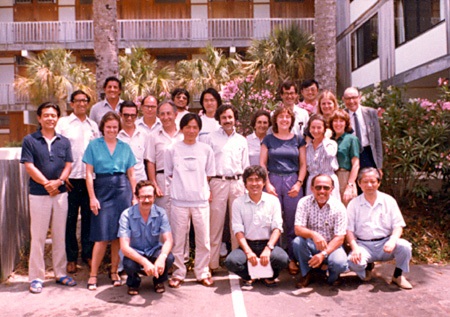An Interdisciplinary Perspective on Andean Ecological Complementarity
Date
May 18-25, 1983Organized by
Shozo Masuda, Craig Morris and Izumi ShimadaLocation
Cedar Cove Conference Center, Cedar Key, FloridaPublications
Andean Ecology and Civilization: An Interdisciplinary Perspective on Andean Ecological Complementarity (S. Masuda, I. Shimada and C. Morris, Eds.) University of Tokyo Press, Tokyo, 1985.Participants
- Alan Craig Florida Atlantic University, USA
- Jorges Flores Ochoa Universidad Nacional de San Antonio Abad, Peru
- Tatsuhiko Fujii National Museum of Ethnology, Japan
- Olivia Harris University of London, UK
- Jorge Hidalgo Lehuede Universidad de Tarapacá, Chile
- Catherine Julien Institute of Andean Studies, USA
- Hideo Kimura Asia University, Japan
- Shozo Masuda University of Tokyo, Japan
- Enrique Mayer University of Illinois, USA
- Craig Morris American Museum of Natural History, USA
- Elias Mujica Instituto Andino de Estudios Arqueológicos, Peru
- John V. Murra Cornell University, USA
- Yoshio Onuki University of Tokyo, Japan
- Lita Osmundesn Wenner-Gren Foundation, USA
- Franklin Pease G. Y. Pontificia Universidad Católica del Peru
- Mariana Mould de Pease Peru
- Susan Ramirez DePaul University, USA
- Maria Rostworowski de Diez Canseco Instituto de Estudios Peruanos, Peru
- Frank L. Salomon University of Wisconsin, USA
- Richard P. Schaedel University of Texas, USA
- Izumi Shimada Harvard University, USA
- Ana Maria Soldi Peru
- Hiroyasu Tomoeda National Museum of Ethnology, Japan
- Norio Yamamoto National Museum of Ethnology, Japan
ORGANIZER’S STATEMENT: The meeting largely focused upon geographical areas and research issues and methodologies shown to be in need of further exploration and testing in previous conferences. This symposium was distinguished by its attempt to be truly (1) diachronic, (2) interregional, and (3) interdisciplinary. The comprehensive title of the volume reflects this intent. The conference brought together 23 Andeanists (archaeologists, ethnographers, ethnohistorians, an ecologist, and an ethnobotanist) from Chile, Great Britain, Japan, Peru, and the United States. Together they covered prehispanic to modern eras and various lowland and highland regions from Ecuador to northern Chile and from the Pacific coast to the Amazonian jungle. The basic subject matter of the symposium was a comprehensive understanding of the character, evolution, and effects and creative dynamism between man and environment in the Central Andes. We felt it essential that the disciplines of ecology and ethnobotany be represented in addition to a broadly conceived group of anthropologists. However, in distinguishing multidisciplinary and interdisciplinary research, we emphasize the need to integrate various disciplines in all stages of their collaborative research, from formulation to implementation of research to analyses of the results. Although most of the contributions in the volume are not, strictly speaking, interdisciplinary in character, the conference was seen as a setting for in-depth discussion of the feasibility and implementation (and for some, mid-stage assessment) of such an integrated approach.
(excerpt from “Andean Ecology and Civilization” introduction by Izumi Shimada)
Wenner-Gren Symposium #91
